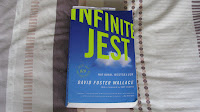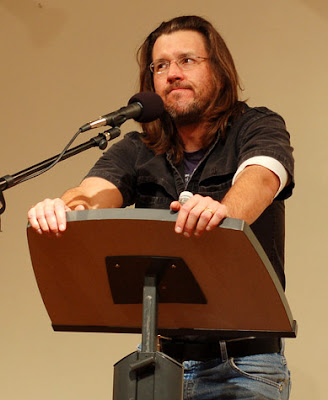 This week I have decided to participate in a sort-of-new social media experiment.
This week I have decided to participate in a sort-of-new social media experiment.Depending on which way you look at it, Infinite Summer was set up either as a challenge to or a support base for those who have had David Foster Wallace's Infinite Jest on their shelves for too long and hadn't until now mustered the strength to lug it off. The "challenge" (for those that see it that way) is to read the book in three months... Well 91 days to be exact; most people began on June 21st and are set to end on September same, thus encompassing all of the summer-official, and hence the name of the experiment.
The reason this is a challenge, and the reason one might also see it as a support base or network or group, is because the book contains over 1,000 pages, a not insignificant chunk of which are endnotes. The length (or heft) of the book is often commented upon but, just in case it's not clear, it is a novel. This is a fictional book to be read for pleasure.
 DFW has for a few years now been one of my favourite writers and Infinite Jest has been taking up a wedge of space on my bookshelf for about the same amount of time. I avoided reading it by absorbing everything else he'd written that I could get my hands on, thinking I'd never have the time to commit to his magnum opus. I was shocked by his suicide last year and was going to post something on this blog but didn't think what I had written was appropriate at the time.
DFW has for a few years now been one of my favourite writers and Infinite Jest has been taking up a wedge of space on my bookshelf for about the same amount of time. I avoided reading it by absorbing everything else he'd written that I could get my hands on, thinking I'd never have the time to commit to his magnum opus. I was shocked by his suicide last year and was going to post something on this blog but didn't think what I had written was appropriate at the time.Many others were upset too. Some like the founders of Infinite Summer were obviously more productive in their response to his passing.
The official website (http://infinitesummer.org/) is set to feature regular blog postings from writers who are reading the book alongside everyone else, commenting on their experiences with the books and making people feel perhaps a little less alone in the challenge. (As well as being long and containing endnotes, the general preconception of the book is that it's difficult.)
Meanwhile, a Twitter hashtag (#infsum) has been set up so that twitterers can comment on the book and then see each others' comments by doing a quick search.
For those who have ever participated in a book club, this may not seem that original or experimental. The first obvious difference from a 'real' book club that meets in a physical location, is that, as with most online groups, distance is no issue; people from all over the globe can alert and update each other as to their progress and interpretations. Twitter also seems to eradicate time issues; it's not exactly asynchronous as it's possible to simulate live chat via Twitter but it's also possible to (dis)engage at any moment. This has its advantages and inevitable its disadvantages.
One criticism, that could also be levelled at Twitter as a whole, is that people don't necessarily communicate but just key others into their own updates via the hashtag. This means the tool sometimes seems to facilitate something more like a support group for addicts ("It's been 7 days. I've read 63 pages. Every day is struggle" &c.) than an actual discussion, but then perhaps that's appropriate given the alleged subject matter of the book. There might also be a parallel to the upcoming "bookaholic" publicity campaign, which Jean Hannah Edelstein reported on earlier this month.
Another disadvantage might be that it encourages instantaneous judgement of the section just read every time the book is put down. Obviously people continuously form and change opinions as they read something but I wonder if Twitter will encourage people to cement those opinions without giving them more than 140 characters to reflect on them.
Having said that, Twitter is only one outlet for those taking part and many are keeping blogs on their progress. You can follow all this yourself by checking out the website (link above) or the hashtag.
I have decided to back-post my tribute for DFW written at the time of his death - you can find it here. I'll let you know if anything interesting in the way of social media experimentation comes up.




